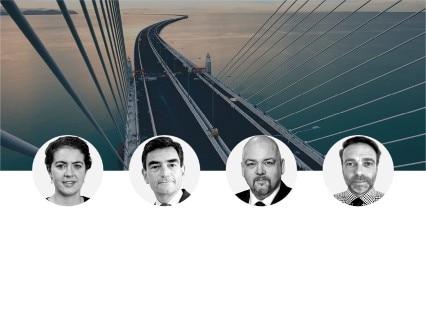After a two year interlude, network managers are once again looking to restart in person due diligences on their sub-custodian providers. However, the due diligence process is likely to be markedly different from what it was like before — owing to the pandemic’s lasting legacy and the emergence of new asset classes and service providers.
Ken Porcaro, NAM Head of Banks Sales, Securities Services at Citi explores how the network manager role is being transformed in the wake of the pandemic.
Facing a new due diligence reality
Despite the logistical challenges faced over the last two years, network managers were still able to perform their roles effectively — albeit virtually. However, as international travel slowly returns to normal, several issues still exist. “We’ve had two years of some travel for some people, and no travel for others. Even today, there are lockdowns and extended quarantines being imposed in markets such as China and Hong Kong. Countries are continuously updating their COVID-19 travel requirements and restrictions, and this is
something network managers need to be mindful of, especially if they are visiting multiple markets over the course of a single trip. If a network manager were to test positive for COVID-19 during their travels, then that could be hugely disruptive to the due diligence review process,” says Porcaro.
The ongoing obstacles impeding international travel means that due diligence reviews on agent banks are likely to be hybridised — whereby a balance is struck between physical on-site visits and virtual calls — for the foreseeable future, a sentiment echoed by most network managers.
The absence of on-site visits has prompted certain providers to cull network managers’ travel budgets. However, cost considerations at global custodians are likely to result in network managers prioritising due diligence visits to agent banks in the larger, more developed markets, as opposed to those in emerging economies — where trading volumes may be lower.
Nonetheless, some network managers are adamant that on-site due diligences must continue. “Due diligence is not something which global custodians can outsource. By going to the local markets, we are building relationships and an understanding of those markets. Furthermore by visiting in person, you are ensuring that the service you are getting is the service which you need. We just recently re-evaluated our due diligence policy following our experience during the COVID-19 pandemic, and we concluded that an exclusive reliance on remote due diligence is not sustainable for a variety of reasons,” says Louis Schwartz, Senior Vice President and Regional Head of Network Management at Northern Trust.
Video conferencing facilities are an adequate communication tool, but the technology does not always allow for meaningful business relationships to be developed. “Visiting the local markets allows network managers to meet regulators and brokers face to face. While this can be done to an extent over Zoom, it is nothing like sitting together and talking and getting to know your peers. You need to have a strong relationship with your partners so that when a crisis situation like Ukraine or Argentina hits, you know where to go to and whom to call,” says Porcaro.
On-site visits also enable network managers to spot glaring red flags, which otherwise might not have been
identified during virtual calls. “Network teams can send out questionnaires, review them virtually and check the box, but that only goes so far,” notes Walter Barys, Senior Vice President, Head of Global Network Management, U.S. Bank.
Technology risk becomes a top priority
A number of network managers are now scrutinising their business continuity planning (BCP), fourth party
risk and cyber defences at their agent banks. This comes as a number of BCPs and supply chains were found wanting during the pandemic’s early stages. In addition, cyber-attacks on financial institutions are increasing exponentially, a situation which shows no sign of abating.
“When I started in network management 10 years ago, there were maybe 20 to 30 questions in my due diligence questionnaire, covering cyber-security, BCP and fourth party risk. Previously, we would spend maybe 15 minutes at the tail end of a due diligence visit talking to agent banks about their BCPs. Nowadays, my team is required to cover areas like cyber security and fourth party risk. In fact, my questionnaire today has 80 to 100 questions on these issues,” says Barys.
While network managers are making it clear that agent banks must have robust technology protections in place, they also want their providers to be innovative. “We are having conversations with all of our providers about developing APIs [Application Programming Interfaces] to support more robust, future-forward technology protections” notes Barys.
New asset classes emerge from the shadows
After more than a decade of dealing with low interest rates, institutional investors are now re-positioning their portfolios to insulate themselves against inflation risk and geopolitical tensions. In order to diversify returns amid these tough headwinds, investors are also building up holdings in more esoteric asset classes — including digital assets and private markets. So what does this mean for network managers?
Custodians are coming under mounting pressure to support institutional clients with their digital asset trading, most notably around safekeeping. This comes after the Office of the Comptroller of the Currency (OCC) in the US confirmed that national banks and federal savings associations could start offering crypto-currency custody services to clients.1
“Crypto has been a big focus for us, given the client interest in this space. We took the approach that cryptosub custodians are going to be part of our traditional network. Crypto-custody is currently a manual process as there are no connections between legacy custody systems and DLT [distributed ledger technology]," comments Barys.
However, Barys stresses there are notable differences between conducting due diligence on a crypto-custodian versus a traditional agent bank. “In contrast to adding a new market, we put together a steering committee and worked closely with our digital office. We did not use the traditional sub-custodian RFP when performing due diligence on our crypto sub-custodians, but rather a custom process that incorporated elements of the standard corporate RFP,” he says.
On monitoring crypto sub-custodians, Barys notes they had to modify their existing sub-custody oversight
programme. “A crypto-custodian is not a bank performing corporate actions, FX or proxy voting. The focus is all about settlement and safe-keeping in a hot and cold storage environment. We did not use the Association for Financial Markets in Europe's Due Diligence Questionnaire [DDQ], but instead created our own crypto DDQ, which is part of the corporate oversight programme,” he says.
As trading activity in digital assets picks up, there are calls for network managers to improve their basic understanding of disruptive technologies. “I wonder whether the next generation of network managers coming into the business will also have to be technology experts. Most network managers today are experts in asset servicing, corporate actions and securities settlements. Will the new generationof network managers have to wear partial technology hats as well?” says Porcaro.
Aside from digital assets, some institutional clients are trying to supplement returns by exploring new avenues of investment. “For example, we are seeing clients faciliate private equity type deals where entitlements are not typically eligible at the central securities depository. Since the procedures required to facilitate such transactions in these markets are not clear-cut, this has created newchallenges for network managers to handle in support of their impacted asset servicing departments,” according to Schwartz.
Due Diligence 2.0
As network teams re-think how they tackle due diligences, many acknowledge that a hybrid approach is likely to be the norm for the next few years. However, the industry is largely in agreement that on-site visits are infinitely better than virtual reviews. The emergence of new asset classes is also forcing network managers to change course and develop different skillsets. Accordingly, network managers need to evolve in lockstep with their clients if they are to fulfil their roles effectively in the future.
1 Asset Servicing Times (July 23, 2020) OCC gives green light on crypto-currency custody services

